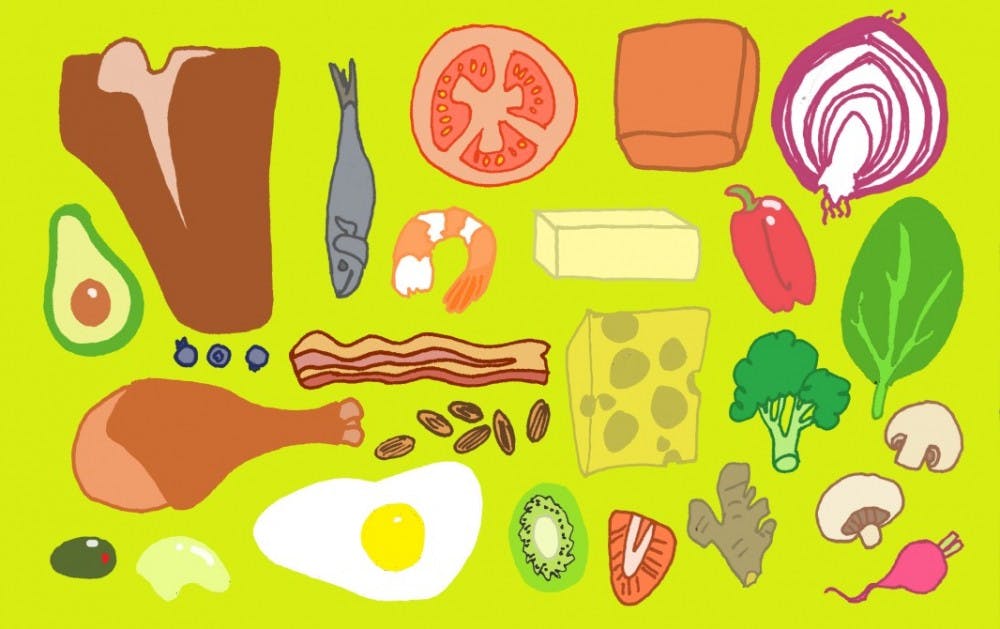Summer is around the corner, and with that comes the pressure of getting ready for swimsuit season. But before starting a new diet, it's important to look at the science behind what it actually does to the body.
The ketogenic diet, or simply keto diet, has become a popular way to lose weight because it provides a fast way to lose weight without cutting down on eating.
Normally, the body relies on carbohydrates to generate energy and stores fat. In the diet, people substitute carbohydrate intake for higher fat intake, forcing the body to burn its own fat reserves and start producing “ketone bodies” as a byproduct.
Once ketone bodies are produced at a sufficient rate, it makes the blood more acidic, indicating the body is in “ketosis” and burning fat instead of carbs to produce energy.
However, the pros and cons of the diet and how it should be implemented into a person’s life have been contested by health professionals for quite some time.
To get a take from a professional, we spoke with Christy Alexon, who is a clinical associate professor of nutrition at the College of Health Solutions and a registered dietician, to "mythbust" some common claims regarding the keto diet.
Here's what she had to say:
Can you give us a background on this diet?
A true ketogenetic diet is probably going to have a total of 30 grams of carbohydrate or less per day.
A lot of people say they're doing keto, but they're eating like a hundred grams of carbs a day and unlimited protein.
There are definitely situations where it's medically appropriate to do a ketogenic diet: for example, a brain cancer patient, specifically stage four glioblastoma, because it could slow tumor growth.
Another example where it would be medically appropriate, and almost necessary you could argue, is with seizure patients. If you have seizure disorder, a ketogenic diet, especially in pediatric patients but adults as well, can significantly reduce seizure activity.
Claim 1: The keto diet is bad for your brain
Some people claim they have all this amazing mental clarity and all that when on the diet, whereas others might experience decreased reaction time and brain fog. It's hard to say. I don't think we have enough data at this point to say it definitely either improves or impairs brain function.
In terms of long term effects, it depends on what types of fats you're consuming, like just a lot of butter and whipping cream versus more heart healthy fats, like olive oil and whatnot. It depends on that as well, but I think the jury is still out on that one to be honest.
Claim 2: Eating fat makes you fat
Your body burns through carbs first, and doesn't need to burn the fat from the food that you're eating because you already met your calories and your energy needs by eating carbs.
Once you've met your calorie needs with all those carbs, it's like, ‘Oh, what do we do with the fat?’ It gets stored. So when people say, 'Oh, I cut out carbs and I lost weight,' it's usually because they cut out foods that are both high in carbs and fats like doughnuts.
People don't get fat from eating just plain white rice. Some of the populations that have the lowest BMI and body weight, in relation to their height, are populations that eat a lot of carbs, but they don't eat a lot of fats. So if you want to do high fat, cool, just keep your carbs and protein a little bit lower to account for that.
Claim 3: Keto lacks nutritional value
If you plan it responsibly and intelligently, it can be fine. However, your average Joe that does keto, who is just like ‘Oh eat bacon and eggs!’ they're not really making an effort to get those micro-nutrients from plant based foods.
It can be done, but it does require working with a nutritionist or doing a lot of homework to make sure that you're not just taking the easy way out and just eating a bunch of meat and cheese and calling it good.
I mainly worry not just about the micro-nutrients like vitamin C, but things like plant phytochemicals, which are plant produced antioxidants. If you use keto as an excuse to cut plant-based foods out of your diet, you're really doing yourself a disservice.
Claim 4: Keto is bad for your gut bacteria
That depends on how strict you're following keto and if you're getting enough fiber. Fiber is necessary for the health of the gut microbiome and to have a good diversity of all the different species of gut bacteria.
Some people doing keto will count net carbs so they can subtract the fiber. Instead of looking at just total grams of carbohydrates that they're eating, they'll try to keep net carbs under a certain amount.
I would say if people can be a little more flexible and modify keto with fiber, like pre-biotic fiber, it can be beneficial for the health of the gut bacteria.
Claim 5: Keto is good for diabetes
So, that is one where you have to be careful, especially if it's someone with Type 1 diabetes or a Type 2 diabetic who's insulin dependent. You could actually put them into severe hypoglycemia, meaning low blood sugar, if you give them a bunch of insulin and they don't have enough carbs.
I think that with diabetics, they don't need a ton of carbs. They need what we would call a consistent carbohydrate diet. It's not widely accepted in the medical field to teach patients with diabetes a ketogenic diet, maybe a lower more moderate carb diet, but carefully monitored to make sure that their blood sugar doesn't get too low.
Reach the reporter at mcharbel@asu.edu or follow @CharbelMilo on Twitter.
Like The State Press on Facebook and follow @statepress on Twitter.




